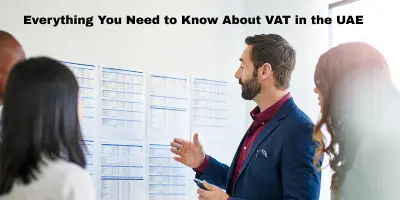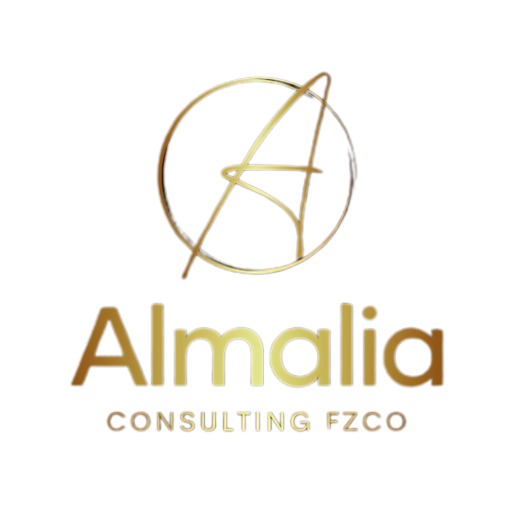
Value Added Tax (VAT) has become a cornerstone of the UAE’s financial and regulatory landscape since its introduction in 2018. For businesses, entrepreneurs, and even consumers, VAT compliance is no longer an option but a necessity. In 2025, the UAE continues to refine its VAT framework, ensuring alignment with international standards while supporting its vision of a sustainable, diversified economy.
At Almalia Consulting FZCO, we provide comprehensive VAT services — from registration and return filing to audit preparation and penalty resolution. With the right guidance, VAT becomes less of a burden and more of a tool for sustainable business growth.
📌 What is VAT in the UAE?
Value Added Tax (VAT) is an indirect tax applied at each stage of the supply chain, levied on the value added to goods and services. In the UAE, the standard VAT rate is 5%, one of the lowest globally, making it both business‑friendly and consumer‑conscious.
VAT is ultimately borne by the final consumer, while businesses act as tax collectors for the government. The system ensures revenue diversification for the UAE while maintaining fairness across industries.
📌 Who Needs to Register for VAT in 2025?
VAT registration is mandatory for businesses that cross certain turnover thresholds. As of 2025, the rules are:
- Mandatory Registration → Businesses with taxable supplies and imports exceeding AED 375,000 annually.
- Voluntary Registration → Businesses with supplies or expenses exceeding AED 187,500 annually.
- Exempt Businesses → Entities dealing exclusively in exempt supplies (e.g., certain financial services, residential property) may not be required to register.
Both mainland and free zone companies in the UAE may be subject to VAT, unless they are located in a designated free zone with specific exemptions.
📌 VAT Rates and Categories
In the UAE, VAT is not one‑size‑fits‑all. The framework includes:
- Standard Rate (5%) – Most goods and services fall under this rate.
- Zero‑Rated Supplies (0%) – Includes exports, international transport, and certain essential goods such as medicines and educational services.
- Exempt Supplies – Includes bare residential property, local passenger transport, and specific financial services.
Understanding the difference between zero-rated and exempt is crucial because only zero-rated suppliers can reclaim input VAT, whereas exempt suppliers cannot.
📌 VAT Compliance Requirements in 2025
Complying with VAT in the UAE involves several obligations:
- VAT Registration – Apply online through the Federal Tax Authority (FTA) portal.
- VAT Return Filing – Most businesses must file VAT returns quarterly, though some may be assigned monthly filing by the FTA.
- Record Keeping – Businesses must maintain invoices, contracts, and financial records for at least 5 years (or longer for real estate businesses).
- Invoicing Standards – VAT invoices must include TRN (Tax Registration Number), clear descriptions, supply dates, and correct VAT amounts.
Failure to meet these requirements can result in hefty administrative penalties.
📌 VAT Penalties in the UAE
The UAE has strict penalties to enforce compliance. In 2025, fines include:
- Failure to Register – AED 10,000
- Late VAT Return Filing – AED 1,000 (first offense), AED 2,000 (repeated offense)
- Late Payment – 2% of unpaid tax immediately, 4% monthly thereafter, up to 300% maximum
- Incorrect Invoices or Records – AED 5,000 per incorrect document
- Failure to Display Prices Inclusive of VAT – AED 15,000
Businesses must take VAT compliance seriously to avoid disruptions and reputational damage.
📌 VAT in Free Zones vs Mainland
Many investors wonder whether free zone companies are exempt from VAT. The answer: not always.
- Designated Free Zones – Some free zones are treated as outside the UAE for VAT purposes. Supplies between designated free zones may not be subject to VAT.
- Non‑Designated Free Zones – Businesses are subject to normal VAT rules, just like mainland companies.
Understanding the free zone classification is essential for accurate tax planning in 2025.
📌 Sector‑Specific VAT Impacts
VAT affects industries differently. Here’s how it plays out in key UAE sectors:
- Real Estate – Residential property sales are exempt, but commercial properties are standard rated.
- Healthcare – Essential medicines and healthcare services are zero‑rated, while cosmetic treatments may be taxable.
- Education – Some private schools and universities qualify for zero‑rating.
- Financial Services – Many are exempt, but explicitly listed taxable services require VAT application.
- E‑Commerce – Online sellers, even those outside the UAE supplying to customers inside the country, may need to register.
📌 VAT Audit and Inspections
The Federal Tax Authority conducts VAT audits to ensure businesses comply. In 2025, VAT audits are becoming more frequent and digitalized. Companies may be asked to provide:
- VAT returns and reconciliations
- Sales and purchase invoices
- Accounting records
- Customs documentation (for imports/exports)
Non‑compliance discovered during an audit can result in fines, penalties, and reputational harm.
📌 VAT Optimization Strategies in 2025
VAT is not just about compliance — smart planning can save businesses money. Strategies include:
- Input VAT Recovery – Ensure proper documentation to reclaim VAT on purchases.
- Zero‑Rated Transactions – Structure exports and international supplies to maximize zero‑rating.
- Tax Grouping – Combine related companies into a VAT group to simplify compliance.
- Accurate Record‑Keeping – Use accounting software aligned with FTA requirements.
- Professional Advisory – Work with tax consultants to identify reliefs and avoid common mistakes.
📌 Why VAT Matters for Businesses in the UAE
VAT is a significant part of the UAE’s journey toward building a sustainable, diversified economy. For businesses, VAT compliance offers more than just avoiding penalties:
- Builds credibility with stakeholders and banks.
- Ensures smooth audits and licensing renewals.
- Creates a professional business image in the global market.
- Allows better cash flow management when handled correctly.
📌 Conclusion
VAT in the UAE is now deeply embedded in business operations. By 2025, companies cannot afford to treat VAT as an afterthought. Understanding registration thresholds, compliance rules, sector‑specific applications, and penalty structures is crucial for long‑term success.
At Almalia Consulting FZCO, we provide comprehensive VAT services — from registration and return filing to audit preparation and penalty resolution. With the right guidance, VAT becomes less of a burden and more of a tool for sustainable business growth.
📩Contact us today to make VAT compliance simple and stress‑free.
